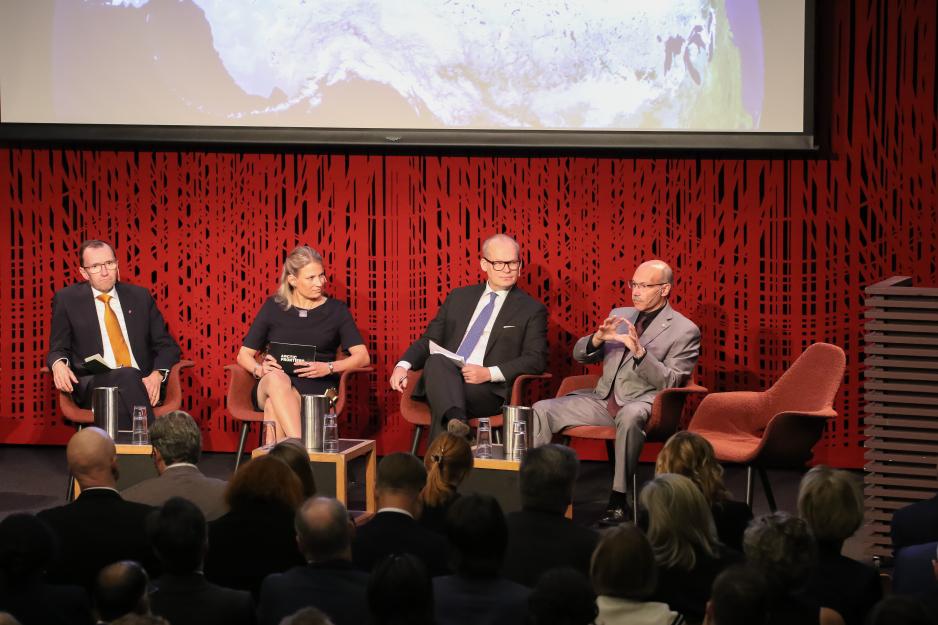Arne O. Holm says Russia's War Against Ukraine Has Divided Norway in Two

Norwegian Foreign Minister Espen Barth Eide (Labor) in debate with Mike Sfraga, Chair of the US Arctic Research Commission and the Polar Institute at the Wilson Center (right) and Pasi Rajala, State Secretary at the Finnish Ministry of Foreign Affairs. Moderator Anu Fredrikson, director of Arctic Frontiers. (Photo: Jan D. Sørensen/FNI)
Comment: Russia's full-scale war against Ukraine has divided Norway in two. For us who live in the High North, the war is a neighbor. In the civilian part of Nordic politics, there is hardly any trace of this recognition.
For three days, I attended a conference with the telling title "Arctic Security Conference 2024". At a safe distance from the border with Russia, politicians, military leaders, researchers, journalists, and others have discussed the security situation in the North.
The conference was organized by the Fritjof Nansen Institute in collaboration with a number of national and international organizations and institutions.
In Oslo, not in the North
Moving the conference to Oslo, and not to the North, is an honest attempt to wake up the part of the population that still believes that increased prices for liver pâté and potatoes are the biggest challenge we face.
Whether it succeeds remains to be seen. In the national news media, Russia's war against Ukraine will continue to be about what is happening in Ukraine. What threatens our own country, or in Finland, which also borders Russia, will rarely reach the ankles of the newscasters.
Stable but unpredictable.
This starkly contrasts what can rightfully be called a real possibility of Russia's war spreading to the Arctic. The risk of proliferation does not lie, as Norwegian Foreign Minister Espen Barth Eide emphasized, among others, in the Arctic.
The imminent danger concerns, for example, misunderstandings or accidents between countries that currently lack significant knowledge about each other. All political channels are closed. What Putin is thinking is, at best, a more or less qualified guess.
In the same way as Putin's view of what the West thinks is neither rational nor knowledge-based.
The sum of expertise
The sum of the expertise gathered at the conference concluded that there is no imminent danger of military confrontation in the north but that the situation is highly unpredictable.

State Secretary for the Norwegian Ministry of Foreign Affairs, Maria Varteressian (Labor) at the Arctic Security Conference 2024. (Photo: Arne O. Holm)
That is why, for example, State Secretary Maria Varteressian, also in the Norwegian Ministry of Foreign Affairs, emphasized several times that the government's most important task is ensuring that people in the north, and especially in Finnmark, can live safely.
Then add that all political decisions concerning Northern Norway are currently based on security policy assessments. It is less about regional needs and strategies. It is about what serves national security. This is a new situation for both the High North and the Arctic nations.
A development that started in 2014, with the annexation of Crimea, and which seriously became decisive for the development after the invasion of Ukraine in 2022.
With this background, it is almost incomprehensible that political measures are not taken to strengthen civil society in the north.
I do not have figures on how many of the speakers emphasized the necessity for people to live in the north, for there to be an operative business community and robust local communities.
Where it failed
Illustrative, perhaps, when State Secretary Varteressian, when asked where the political efforts in the north have been weakest, points to the population trend. Or, as she said when describing where the policy has failed:
A quite different war to the price war on liver pâté.
"Finding out what it takes for people to move north. We have pointed far too little to the importance of people. That is the most important thing. Without people, we can simply forget about talking about security policy."
A statement that is both startlingly honest and, at the same time, recognizable to us who live in the North.
Because the knowledge that leads to this conclusion is well known and has been described for several decades, and with ever greater strength as Russia has loaded its deadly weapons.
To emphasize the gravity, Russia closed the airspace on the border with Norway the day before the conference. Allegedly because Ukrainian drones attacked these strategically and militarily important areas in the North, that are so important to Russia.
We already know that Russian warplanes have taken off from the same area to participate in the war against Ukraine.
In full swing
To put it plainly. The war is already in full swing on the border with Norway - and Finland. It is something quite different from a price war on liver pâté and potatoes.
It is completely incomprehensible.
It is incomprehensible, as I said, that this does not trigger a joint political effort in what a unanimous Storting has time and again called and still calls Norway's most important strategic investment area.
In parallel with the news about drone attacks close to the border between Norway and Russia, we receive almost daily news reports about a healthcare system in a deep and seemingly intractable crisis in Finnmark, a continuous lack of power lines to carry electricity to those who need it, a fishing industry in Gamvik and Mehamn that within a few days collapsed completely and sent its employees into permanent unemployment at a time when the population continues to move southward.
And nothing is done?
Blew its own horn
Well. The government blew its own horn for a long time when it introduced free childcare in Finnmark and parts of Northern Troms.
To the extent that this would have any effect, this was effectively torpedoed when the same government soon after introduced a ceiling of NOK 2,000 for kindergartens in Oslo and the rest of the country, or NOK 1,500 in slightly smaller urban areas.
These 1,500 kroner were to entice northerners to stay and southerners to move north. There are several such examples. They are well-intentioned but have in common that they hardly make an impression on those who move or those who could be lured north.
The effect of the measures cannot be detected even if they are put under a microscope.
When "everyone" agrees that too little or nothing has been done to build strong local communities in the North, it is entirely incomprehensible that this does not trigger cross-party recognition that Russia's war in Europe, on the border with Norway and Finland, requires extraordinary measures and solutions in the North.
Not for the sake of the population in the North but for the sake of national and European security, at a time when bloodthirsty dictators have as their primary ambition to subjugate parts of Europe.
Editor's note: Arne O. Holm led a debate on journalism in the Arctic during the conference.


